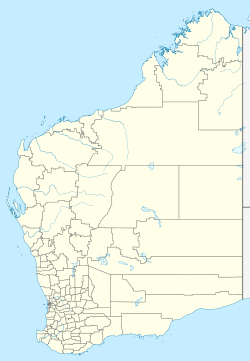Escape Island facts for kids
Escape Island is a special island located near Jurien Bay in Western Australia. It's a fascinating place known for its unique animals and an important lighthouse.
Contents
About Escape Island
Escape Island is about 27.33 hectares (68 acres) in size. That's like 67 football fields! It sits about 5.0 kilometres (3 mi) away from the mainland. The highest point on the island is about 12 metres (39 ft) tall.
This island is part of a special group of islands called the Turquoise Coast islands nature reserve. This chain includes 40 islands that stretch for about 150 kilometres (93 mi) along the coast. These islands are protected to keep their natural beauty and wildlife safe.
The Escape Island Lighthouse
| Coordinates | 30°20′00″S 114°59′11″E / 30.333422°S 114.986490°E |
|---|---|
| Year first constructed | 1930 (first) |
| Year first lit | 1980 (current) |
| Automated | 1980 |
| Foundation | concrete |
| Construction | metal skeletal tower |
| Tower shape | square frustum tower with balcony |
| Height | 24 metres (79 ft) |
| Focal height | 30 metres (98 ft) |
| Range | 15 nautical miles (28 km; 17 mi) |
| Characteristic | FI (3) W 15s. |
| Admiralty number | K1756 |
| NGA number | 9140 |
| ARLHS number | AUS-072 |
An important lighthouse was built on Escape Island in 1930. It was originally 96-foot (29 m) tall. When it was first built, the light was very bright. It could be seen from about 15 miles (24 km) away!
The light would flash three times every fifteen seconds to help ships navigate. At first, it used gas to power its light. But in 1986, it was updated to use solar power. Now, it's a modern, unmanned light on top of a strong steel tower.
How Escape Island Was Formed
Escape Island and other nearby islands were created around 10,000 years ago. This happened when sea levels changed a lot during very cold periods called glaciation. During these times, large areas of the ocean floor, called the continental shelf, became exposed.
Over time, big sand dunes formed and became hard rock, known as limestone. These hardened dunes eventually became the islands we see today. Most of these islands have been separated from the mainland for about 6,500 years.
You can find cool rock formations on Escape Island. These include special fossil root networks called rhizoliths. They are very delicate and show how plants grew there long ago.
Animals Living on Escape Island
Escape Island is home to several interesting animals, especially different types of skinks (a kind of lizard).
- The Jurien Bay skink likes to live in the cracks of the limestone rocks.
- The bull skink prefers to dig shallow burrows in the sandy soil.
- King's skinks often make their homes in burrows dug by petrels (a type of seabird).
In 1999, something exciting happened on the island! Forty dibblers were released there. Dibblers are small, rare marsupials. These dibblers were raised at Perth Zoo as part of a special program. This program, called Western Shield, helps to protect and bring back native Australian wildlife.
 | William L. Dawson |
 | W. E. B. Du Bois |
 | Harry Belafonte |


